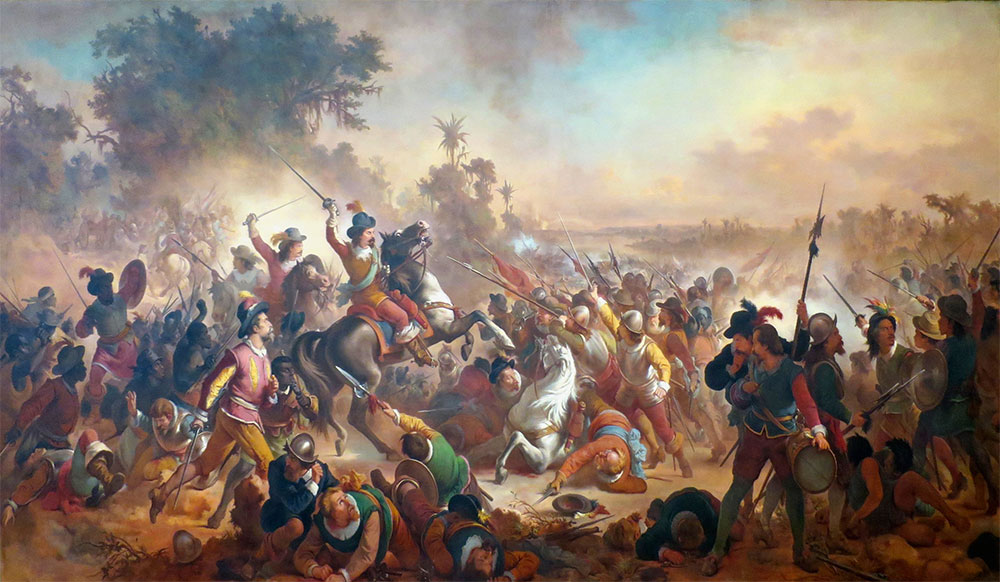History
The Potiguara and the Cristian Wars
One of the ethnicities that most suffered with imposed catechization by colonizing nations were the Potiguara. On the pinnacle of the political-religious war that afflicted Europe, unleashed by the Protestant Reform and the Catholic Counter-Reform, the Brazillian natives lied amidst the crossfire of Christian doctrines.
In Paraíba, catholic evangelization began, with full force, in 1587, when expeditions of the Iberian Union started to count with the presence of religious men. At first, the mission work was done by the Jesuits who preached and also tried to diminish violence from the colonizers towards the Indians.
Foreign pioneers and frontiersmen, however, ignored the pontifical decrees in favor of the autochthonous, issued in 1537, which Pope Paul the III prohibited slavery, and also dismissed the belief of their irrationality, declaring them capable of receiving the Christian faith.

The Christian Reformed Church, in its turn, came to Brazil under the Dutch flag, in 1630, time when the Potiguara saw them as liberators of the oppression exerted by the Spanish and Lusitanian invaders.
As the Dutch headed deep into the Northeast reformed congregations were introduced.
Actions started on top of the work that was already done, by religious orders of Jesuits, Franciscan, Carmelites who had already thought a few prayers, apostolic confession, and even baptisms.
In 1638, the Potiguara Indians, in Paraíba, expelled the priests from their nucleus and requested pastors in the villages. The chosen were David à Doreslaer and Johannes Eduardus who, besides expanding missionary work, dedicated themselves to the ambitious project of instruct catechism in Tupi.
Pastor Eduardus translated segments of the Bible and David organized a book “A Simple and Brief Instruction to the Word of God”, written in the Brazillian, Dutch and Portuguese languages.
The work, that had notes and forms for baptism and Holy Communion, was printed in Holland and distributed in Brazil by the Western India Company, in 1641.
At the beginning of the Pernambucana Insurrection movement, in 1645, that culminated on the expulsion of the Dutch, ten years later, a series of letter exchanges between Potiguara leaders became symbol of the religious propaganda war that separated its people.

On the Portuguese-Catholic side (Restauration War had already separated Portugal from Spain), Captain Antonio Felipe Camarão and the Sargent General Diogo Pinheiro Camarão. On the other side, Alderman and Commander of Paraíba Indians Regiment, Pedro Poty and Alderman of Rio Grande do Norte Indians, Antonio Paraupaba, allied of the Western India Company.
Messages written in Tupi tried to convince the opponents to change sides and surrender.
The first letter, destined to Pedro Poty, sent in October 22, by his cousin, Diogo Pinheiro Camarão:
“You are a good relative. Leave this place that is like fire in hell. You do not know you are a Christian? Why you want to pervert thyself? If the Portuguese succeed in was is because, being Christian, the Lord our God do not allow them to flee or lose themselves, thus we wish you shall return to our side, this is granted by the word of the great captain Antônio Philippe Camarão and of the Portuguese captains”.
On October 31st, day of the Protestant Reform, the articulated Pedro Poty, full of conviction, answers:
“Thou shall not believe we are blind and we cannot acknowledge the advantages we enjoy with the Dutch, among who I was instructed. It was never heard that they enslaved any Indian or have murdered or mistreated one of our own. They call us and live with us, like brothers. Over the entire country our own are found slaved, perverted by the Portuguese, and many would still be, if I have not liberated them. The outrage that has been done to us, more than to the black, the butchering of our kind, executed by them, in Baía da Traição, are still fresh in our memory. Abandon, therefore, cousin Camarão, these perverted”.
Both cousins died before end of the so called Divine Light War, also known as Pernambucana Insurrection. Camarão passed away in 1648, after the first Guararapes battle, and Poty, the next year, was imprisoned at Cabo de Santo Agostinho, on the second Guararapes battle.
In 1652, the Potiguara hero died onboard a Portuguese vessel that was taking him for trial by the Saint Inquisition Court, in Lisbon.